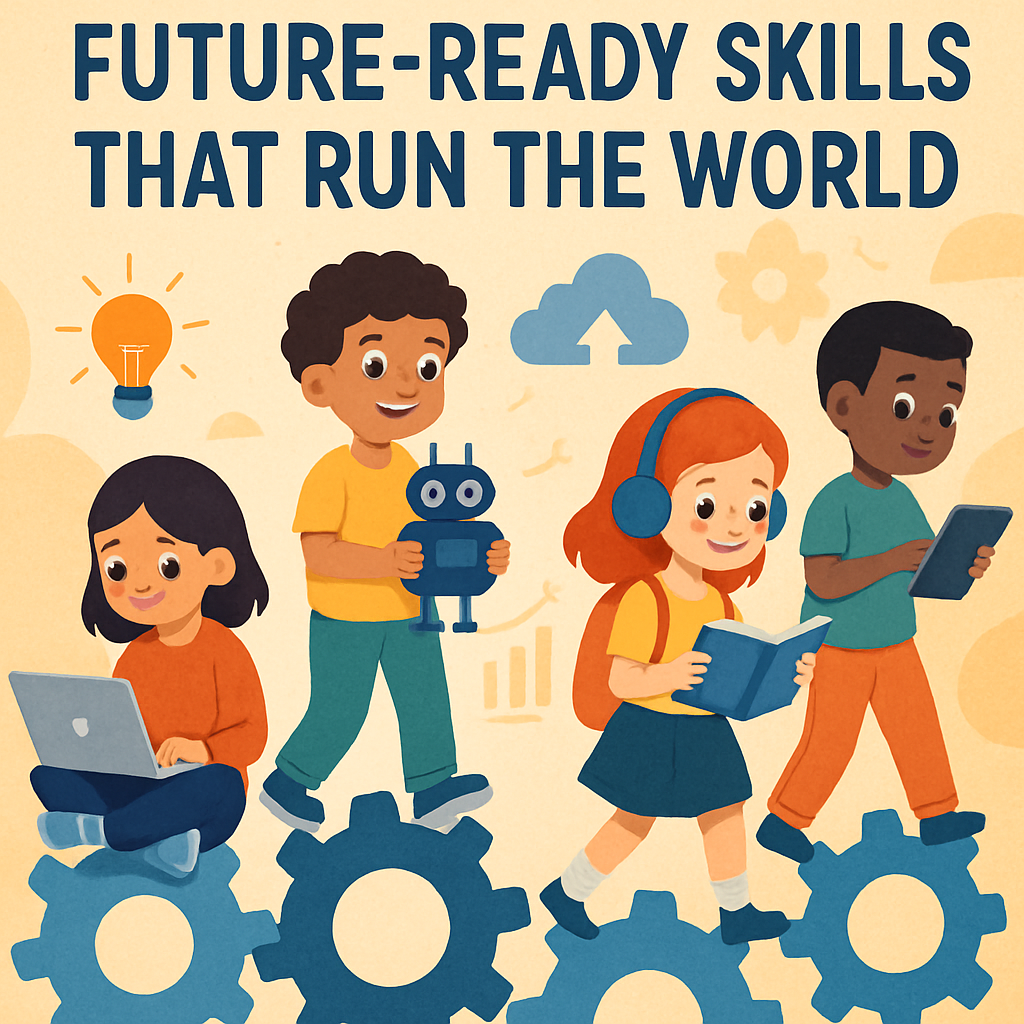
Stop Calling Them Soft: Future-Ready Skills That Run the World
The most important skills your child will ever learn are not locked in a textbook. They grow in tiny, unphotogenic moments that never make the report card. Snack time. Bedtime. Playtime. Even boredom. That is where future-ready skills take root. And they matter for every person in a child’s world.
What we mean by future-ready skills
Future-ready skills are human skills. Self control, empathy, listening, problem solving, perseverance, curiosity, and teamwork. These are the muscles behind confidence. Academic knowledge opens doors. Human skills decide how far we walk through.
Why they matter for each of us
Students.
A student who can wait their turn, handle frustration, ask for help, and try again learns faster and feels braver. Fewer meltdowns. More independence. More joy.
Parents and caregivers.
Future-ready skills make family life calmer. They turn power struggles into teachable moments and help kids own their choices. You become a coach, not a constant referee.
Educators.
Future-ready skills are the engine of learning. Classrooms run smoother when students regulate emotions, collaborate, and listen for understanding. Behavior improves. Instruction time grows.
Leaders.
Schools thrive when adults practice what we teach. Leaders who model curiosity, clear communication, and repair after conflict create cultures where people feel safe to learn and to try.
What employers keep asking for
Across employer surveys and hiring manager polls, the same human skills sit at the top of the list. Reliability and work ethic. Clear communication. Teamwork. Time management. Problem solving and decision making. Critical thinking. Adaptability. Leadership potential. Conflict resolution. Creativity. The reason is simple. Companies can train tools and software. They cannot quickly train follow through, respect, or the habit of solving problems together. These skills turn knowledge into results.
Translation: the way we show up, speak up, and team up matters. Let us build those muscles on purpose.
Do this tomorrow at home
You do not need fancy programs. You need consistency, presence, and patience.
- One-minute wait before snacks. That is impulse control and work ethic.
- Narrate your problem solving. “I am annoyed. I will breathe, then make a list.” That is modeling regulation and decision making.
- Turn “I am bored” into exploration. Make a choose-one list: draw a map, build a fort, invent a snack. That is creativity in disguise.
- Praise strategy, not magic. “You broke it into parts. That worked.” That is grit taking shape.
- Use if-then plans. “If I feel mad, then I take three breaths and ask for space.” That is time management and self control.
- Practice tiny repairs. “I am sorry. I was sharp. Let me try that again with respect.” That is conflict resolution and empathy.
Family script to try:
“Name the feeling. Pick a tool. Try it for two minutes. Check how it worked. Choose the next step.”
Do this tomorrow in the classroom
Quick, low-lift routines change everything.
- Two-minute warm up that names a focus skill. Listening. Turn taking. Help seeking.
- Sentence starters on the board. “I agree because.” “I see it differently because.” “I need help with.” That is communication and critical thinking.
- Normalize repair. “Name the impact. Own your part. Make a plan.” That is teamwork and conflict resolution.
- Self-monitoring checks. Simple 1 to 5 for energy and focus. That is adaptability and self awareness.
- Two-minute closing reflection. One win. One wish. One next step. That is time management and metacognition.
Do this tomorrow as a leader
Build the habits you want students to have.
- Short, clear meetings with purpose and next steps. That is modeling communication and time management.
- Tell the story of effort. Celebrate small wins in public. That is how cultures learn work ethic.
- Practice conflict scripts with adults. Clarify. Acknowledge. Request. Explore. That is conflict resolution and leadership.
- Protect feedback time. Weekly one-to-ones that ask, “What is working. Where are we stuck.” That is coaching and accountability.
Simple ways to notice progress
No clipboards needed.
- Keep a sticky-note tally of calm-down tries, helpful asks, and peer support moments.
- Snap a photo of a reflection sheet at the start of the month and again at the end.
- Ask kids to teach the skill back. Teaching is proof of learning.
This week’s tiny actions
Parents.
- One-minute wait before snacks three days this week.
- Teach one calm-down tool. Breathe in for four, out for six.
- Praise one strategy you see. “You stuck with it by breaking it into parts.”
Educators.
- Add sentence starters to your next discussion.
- Try a two-minute closing reflection.
- Practice a repair line. “I heard you. Here is what I can do next.”
Leaders.
- Begin each meeting with a check-in question.
- End each meeting with who, what, when.
- Share one story of a staff member who modeled empathy or perseverance.
Common potholes to avoid
- Perfection hunting. Progress beats perfect.
- Lecture mode. Practice beats speeches.
- Only praise outcomes. Process praise grows skill and confidence.
For the heart
If this stirs worry, that is normal. Parenting and teaching ask us to be brave and human at the same time. You are not behind. You are beginning. Future-ready skills grow in small, ordinary moments that you already have. Pick one practice. Repeat it. Celebrate the tiny wins. They compound.
Future-ready skills are not soft at all. They are the scaffolding of every success that follows.

.png?width=1000&height=199&name=SG-Logo3-Transparent-1000x199px%20(1).png)


.jpg?width=100&height=100&name=elementary%20student%20squeezing%20a%20stuffed%20animal%20while%20holding%20their%20breath%20(1).jpg)

